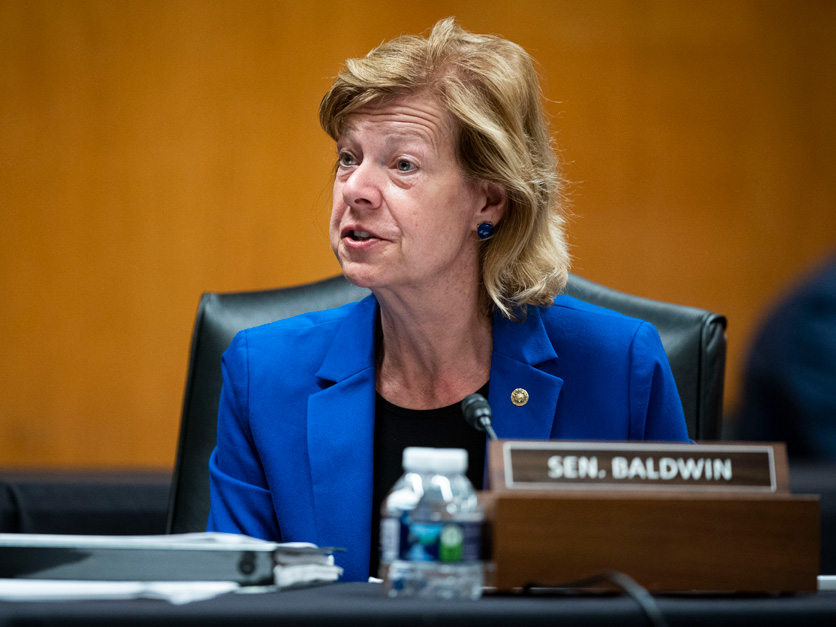Although changes to the Food and Drug Administration’s ability to evaluate zootechnical animal feed substances (ZAFS) were not included in the continuing resolution passed over the weekend, other options are being considered to move the language this fall.
Originally targeted for inclusion in the reauthorization of the Animal Drug User Fee Act (ADUFA) and the Animal Generic Drug User Fee Act (AGDUFA), the Senate attached the Innovative Feed Enhancement and Economic Development Act provisions to its ADUFA reauthorization language out of committee. The last-minute CR deal included a “clean reauthorization” without the language sought by the FDA and the industry to offer the new feed regulating authorities.
ADUFA allows FDA’s Center for Veterinary Medicine to collect fees from animal health companies, which fund the agency’s review and approval process for new animal drugs. CVM Director Tracey Forfa said the agency is “gratified” that ADUFA and AGDUFA were included in the continuing resolution as it extends “vital programs, without changes, for the next five years.”
However, Forfa said the Innovative FEED legislation would be crucial to change CVM's novel feed ingredient approval process. FDA has been criticized for not acting quickly or transparently to approve feed additives designed to promote feed efficiency and reduce methane emissions. The Innovative FEED bill, which cleared a Senate committee earlier this summer, is widely supported by industry stakeholders.
“The FDA is looking to the future with its Animal and Veterinary Innovation Agenda and remains committed to modernizing its regulatory framework to recognize animal food ingredients that act solely within the gut of the affected animal with scientifically substantiated claims related to nonnutritive benefits like animal production, animal well-being, food safety and environmental benefits,” Forfa told Agri-Pulse following the CR vote.
“A ZAFS framework would create a pathway to market that takes the specific circumstances of these unique substances into consideration while still requiring evaluation of the safety and utility of a ZAFS under the animal food additive petition (FAP) process before it enters the food supply,” Forfa continued.
 CVM Director Tracey ForfaIn a previous conversation with Agri-Pulse, Forfa said in September she believes there is "wide stakeholder support" for making the feed additive regulatory process more like that for food additives than animal drugs.
CVM Director Tracey ForfaIn a previous conversation with Agri-Pulse, Forfa said in September she believes there is "wide stakeholder support" for making the feed additive regulatory process more like that for food additives than animal drugs."Historically, these products — because of the way that our regulatory frameworks are structured — would fall into the traditional animal drug review process, but we recognized that process isn’t completely best suited to review these types of products,” Forfa said at the time. “We still are hoping to get these new authorities to be able to evaluate these types of food additives.”
Forfa said FDA remains excited about the opportunity for Congress to move this forward. “We really do hope that Congress will support it as well. We’ve gotten a great deal of support from Congress and others.”
One of the original bill sponsors, Sen. Tammy Baldwin, D-Wis., said she was glad to see a bipartisan vote to advance the Innovative FEED Act earlier this summer by a vote of 19-2 out of committee.
“Now that we’ve upheld our responsibility to our farmers and ranchers in our legislation to keep the government open, I am fighting to pass our Innovative FEED Act to cut the onerous bureaucratic processes that are stopping our agriculture community from competing on the world stage,” Baldwin said in a statement to Agri-Pulse.
Staff for Sen. Roger Marshall, R-Kan., another co-sponsor of the Innovative FEED bill, said hope remains for passing the changes in future legislation yet this year.
“In the interest of sticking to ‘as clean a CR’ as possible, the policies that we adopted in both the House and Senate markups were left out of the temporary government funding measure. This allows for these important fees to be reauthorized as members on both sides of the Capitol continue to work through differing opinions on how best the policies can be reformed. There is recent precedent where other similar underlying fees were reauthorized in a short-term funding bill, and then policy changes were added in a later full year funding bill.
It’s easy to be “in the know” about what’s happening in Washington, D.C. Sign up for a FREE month of Agri-Pulse news! Simply click here.
“We believe the same process will occur here and adoption of the Innovative FEED Act will be signed into law in the coming months so that farmers can increase the sustainability of their operations by boosting efficiency, lowering input costs and decreasing by-products,” Marshall’s office said in an email to Agri-Pulse.
Leah Wilkinson, the American Feed Industry Association’s vice president of public policy and education, said although AFIA was glad to see ADUFA, the organization is “disappointed that ADUFA passed without the Innovative FEED Act.” She said supporters will continue to seek other legislative vehicles for moving this forward yet this fall.
“The need for producers to get access to new feed technologies that help them improve animal health, food safety and the environment has not changed,” Wilkinson said. “We will continue to work with the over 135 animal agriculture organizations and companies in support of the Innovative FEED Act to find other vehicles for moving this critical legislation this fall.”
 Sen. Tammy Baldwin, D-Wis. (Al Drago/Pool via AP)
Sen. Tammy Baldwin, D-Wis. (Al Drago/Pool via AP)The FDA, Forfa added, “recognizes that innovations in animal product development and review offer tremendous opportunities for advancing human and animal health and that a smart, risk-based regulatory approach can support and spur progress in the U.S. animal health, agriculture and food industries.”
Jesse Sevcik, Elanco’s head of government affairs, said the company “will continue to support FDA’s innovation agenda and their efforts to modernize feed additive regulations to foster innovation, embrace scientific advances and help American farmers access feed ingredients already in the hands of their competitors.”
In a release, the National Cattlemen’s Beef Association said it “fought hard to ensure that this latest ADUFA reauthorization contained no post-market amendments that would harm the effectiveness of the FDA’s review process, disrupt producers’ access to cattle medicines, or simply keep the legislation from passing Congress before the September 30th deadline.”
Hunter Ihrman, NCBA director of policy communications, said NCBA does not have a policy “for or against the Innovative FEED Act,” but rather pushed for a “clean reauthorization.” ADUFA reauthorization was a top priority decided by cattle producers at NCBA’s 2023 Cattle Industry Convention earlier this year.
Regarding the ADUFA reauthorization, Elanco’s Sevcik said, “Ensuring predictability and reliability of innovation reviews is critical to bringing American farmers new tools to address a number of key issues from food safety and security to sustainability. Reauthorizing ADUFA was key to continuing FDA’s important work ensuring the safety and efficacy of new innovations.”
For more news, visit www.Agri-Pulse.com.


